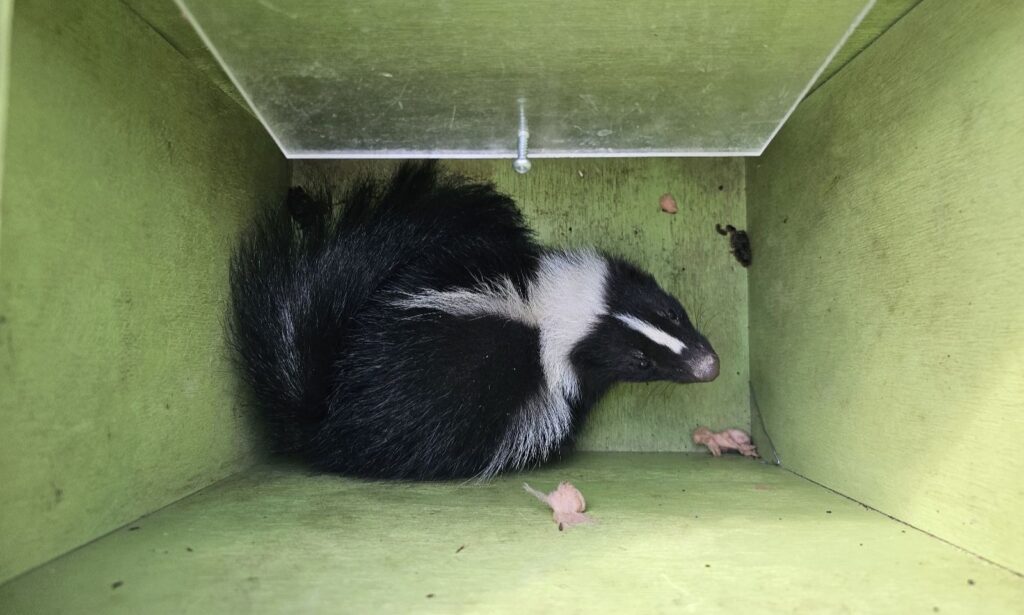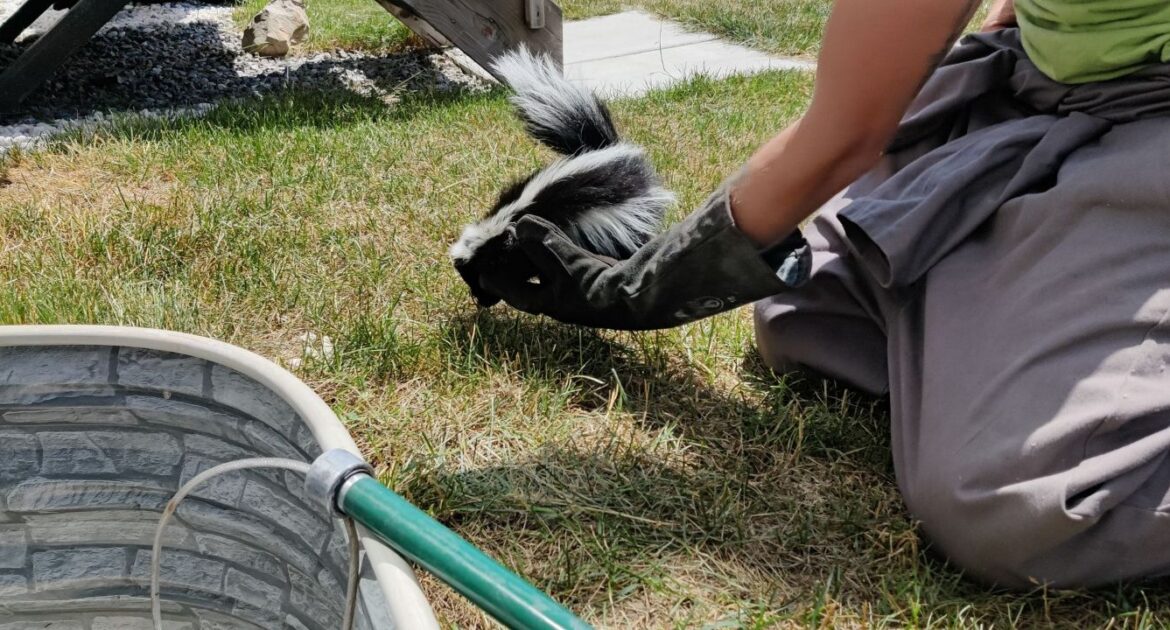When you step out into your Marietta backyard, you might notice a peculiar yet persistent visitor: the skunk. With their distinctive black and white stripes and unmistakable scent, skunks are not only iconic but also surprisingly common residents in urban and suburban areas. Our homes can unwittingly become ideal habitats for these creatures, making it crucial to understand the factors drawing them to our properties. If you’ve ever wondered what might be attracting these nocturnal guests, you’re not alone—and you’re about to find out.
Understanding why skunks find your yard appealing is the first step in humane wildlife management. Skunks are primarily driven by the need for food, water, and shelter, all of which they might find within the comforts of your property. With their knack for finding grubs in your lawn, seeking refuge under decks, or even rummaging through your trash, skunks may see your home as a veritable paradise. As your go-to resource, Skedaddle Humane Wildlife Control in Marietta is here to help you uncover the skunk habitat facts and offer solutions on how to deter skunks from moving in next door.
By identifying and addressing these attractants, we’ll guide you through the process to keep your property free from intrusions. So, let’s dig deeper into what attracts skunks to your yard and explore effective strategies for coexisting peacefully with these enigmatic creatures.

Why Skunks Find Your Space Inviting
These animals are predominantly nocturnal and lead solitary lives, favoring properties that offer minimal disruption. Quiet, secluded areas allow them to forage and rest undisturbed. Ensuring your outdoor lighting is sufficient and regularly altering your landscape layout can make your space less inviting during their active hours.
Territorial marking is vital for skunks, and they may be drawn to properties with prominent landmarks like trees, rocks, and fence posts. These serve as ideal marking sites. If your area has existing animal scents, it may signal a welcoming habitat, attracting more of them. Regularly washing these areas can help deter additional interest.
Unwittingly, your property might provide an irresistible allure for skunks. Understanding the specific factors that make your space particularly attractive to these creatures can empower you to create an environment that’s less inviting to them.
- Food Sources
Skunks, being omnivorous creatures, have a diverse diet that allows them to thrive in various environments. They are particularly attracted to insects and grubs that can often be found in backyard gardens and lawns. These serve as a primary food source for skunks, particularly in the warmer months when insect populations increase. Additionally, these animals are known to prey on small vertebrates such as mice and voles, which may also inhabit your property if conditions allow.
Beyond natural prey, skunks are opportunistic feeders that will not hesitate to take advantage of human-related food sources. Properties with easily accessible pet food, bird seed scattered beneath feeders, or open compost piles can be enticing to skunks searching for a reliable meal. These abundant food sources not only attract skunks but can encourage them to return, reinforcing their presence on your property. Ensuring these potential attractants are secured can be pivotal in managing skunk activity and deterring them from inhabiting your space.
- Water Sources
Water is crucial for skunks, and properties that provide easily accessible water sources can become attractive habitats for them. Skunks require a consistent water supply for both drinking and maintaining their hydration levels, particularly during warmer months. Natural features such as ponds and lakes are inherently appealing to skunks, offering abundant, clean water sources. Similarly, human-created elements like pet water dishes are convenient for skunks seeking a quick drink.
In addition to natural and intentional water sources, unintentional sources such as leaky pipes and clogged drains can also draw these animals to your property. Persistent leaks may create wet areas that promise a constant water supply, while neglected drains can accumulate standing water, serving as a hydration source for wildlife. Identifying and fixing such issues can significantly reduce the attraction for skunks, minimizing their likelihood of frequenting your yard. Proactively managing all potential water sources is a vital step in preventing skunks from settling in your space.
- Perfect Places to Settle Down
Skunks are always on the lookout for optimal denning sites that offer safety and seclusion for their nocturnal lifestyle. Naturally, they may seek out hollow logs, rock piles, and abandoned burrows to establish their dens. These locations inherently provide the cover and protection skunks need to raise their young and retreat during the day. However, when these natural options are not available, skunks can easily adapt to urban and suburban settings by utilizing man-made structures that mimic these conditions.
Properties with suitable denning sites often become inviting to these animals. Woodpiles, for instance, can create hollow spaces that resemble the interior of a log, offering a sheltered environment. Similarly, rock walls and brush piles offer crevices and gaps that skunks can exploit as hiding spots. These areas not only provide protection from predators but also serve as effective shelters against harsh weather. As a property owner, it’s important to regularly inspect and manage these potential denning sites by securely stacking woodpiles, maintaining rock structures, and clearing out excessive brush. By doing so, you can make your property less appealing for these animals seeking a place to call home.
- Vegetation and Cover
Skunks thrive in environments where dense vegetation offers adequate shelter and protection from potential predators. These creatures are particularly fond of areas with dense shrubs and thickets, which provide excellent cover and concealment. Tall grasses are another favorite, as they allow these animals to move stealthily while foraging for food and seeking out nesting sites. Wooded areas, with their natural array of fallen leaves, underbrush, and trees, create an ideal habitat where skunks can securely establish their dens.
Properties featuring such types of vegetation can inadvertently become attractive to skunks. The natural shelter provided by dense plant life not only offers skunks a safe retreat but also makes it easier for them to remain undetected by both humans and predators. Additionally, these environments may support a variety of prey animals and insects that skunks favor, further increasing the appeal. Homeowners can manage vegetation to discourage skunk presence by trimming shrubbery, mowing tall grasses, and maintaining a neat garden, thereby reducing potential hiding spots and ensuring a less inviting landscape for skunks looking to settle down.
- Soil and Burrowing
Skunks are excellent diggers, and their burrowing activities are heavily influenced by the type of soil available on your property. They prefer loose, sandy, and well-draining soils, which facilitate easier excavation and the creation of their dens. These soil types not only allow for straightforward digging but also enhance drainage, ensuring the burrow remains dry and comfortable.
Properties with such soil conditions can become particularly attractive to these animals as they provide the perfect environment for setting up a den. Skunks may be drawn to residential areas where the ground offers minimal resistance to digging, allowing them to establish secure underground homes rapidly. Managing the soil quality and structure around your home, such as compacting soil or strategically placing barriers, can help deter skunks from choosing your property as a preferred burrowing location.
Partnering with Skedaddle Humane Wildlife Control
Understanding what attracts skunks to your yard is essential for effective management. Your Marietta property may inadvertently become a skunk haven due to abundant food supplies like insects, grubs, and unsecured trash, alongside reliable water sources. Skunks also prioritize accessible shelter, thriving in quiet areas with rock piles, brush, and dense vegetation. Furthermore, loose soil conditions facilitate their burrowing instincts.
The proactive identification and mitigation of these attractants are crucial in preventing skunk infestations. Addressing food, water, and shelter sources can significantly diminish a property’s appeal to skunks. Regular maintenance, such as securing trash and trimming vegetation, plays a vital role in maintaining an environment less inviting to these nocturnal visitors.
For Marietta homeowners seeking professional assistance, Skedaddle Humane Wildlife Control offers expertise in skunk control and exclusion services. Our experienced technicians are equipped to identify and address the specific features that make your property attractive to skunks. By applying humane and effective strategies, we help you maintain control and deter skunks from settling on your property.
Contact us to request a quote and learn more about skunk habitat facts and how to deter skunks from your yard effectively. Together, we can ensure your property remains a safe and skunk-free space for you and your family.




